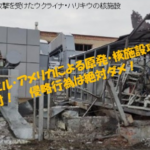3月17日、『琉球新報』に「乗松聡子の眼 47回 ロシア『悪魔視』に疑問 戦争の教訓を生かせ」を載せてもらいました。その記事に引用した、国際民主法律家協会(IADL、(1946年創立、50ヶ国以上の構成員が参加)の3月8日声明の英語版はIADLのHPにあり、その日本語訳は日本国際法律家協会(JALISA)のHPにありますが、ここにも両ヶ国語版を転載します。(この声明は、2月26日に出た簡潔な声明の続編。)
3月8日声明の要求項目はこれらです。
軍事活動の停止につながる即時停戦
西側による挑発の停止
世界的な平和交渉では、紛争の根本原因に対処し、中央ヨーロッパに平和地帯を作る必要がある
一方的な強制措置(制裁)を課すことは、外交ではない
2つの声明において、IADLは、「軍事行動の即時停止」と「国際法および国連憲章に則った紛争終結のための即時交渉」を要求しました。「国連憲章第51条の下でロシアがウクライナに対して行った軍事行動を法的に正当化することはできない」と、ロシア軍の行動は「違法な侵略である」と非難した上で、NATOについては「国連憲章に違反する違法な組織」と糾弾しています。とくに「カナダとメキシコがロシア連邦と同盟を結び、米国国境に大規模な軍事力を備え始めたら、米国は自国の安全保障が脅かされると考えるに違いない」との視点の転換は、説得力を持つと思います。ロシアの侵攻を非難し停戦を求めると同時に、「西側の挑発」という「根本原因」と、経済制裁は「外交ではない」(制裁は、准戦争行為です)との明確なスタンスを打ち出したIADLに敬意を表します。
IADLのメンバーである笹本潤弁護士はこう語っていました。「IADLにはウクライナの法律家協会も加盟しており、マイダン革命以来のウクライナ政府による共産党への弾圧・解党に抗議し、裁判傍聴などの支援活動を行ってきた。NATOは国連憲章に違反していると一貫して主張し、NATOの東方拡大や米国による内政干渉もロシア侵攻を招いた大きな要因であると考えるメンバーが、マジョリティを占める」と。
この戦争の終結のためにも、多方面から情報を取り入れ、歴史と文脈を考慮した発信をしていきたいと思います。
以下、IADL2022年3月8日声明日本語版と英語版です。
国際民主法律家協会 International Association of Democratic Lawyers
国際民主法律家協会(IADL)は、ウクライナで進行中の戦争の激化に関する声明を発表した。 国際社会に対し、平和への道を見出すことを要求する
IADL statement on the escalating war in Ukraine: Finding the road to peace
国際民主法律家協会(IADL)は、ウクライナで進行中の戦争の激化に関する声明を発表した。 国際社会に対し、平和への道を見出すことを要求する
2022年3月8日
ロシアのウクライナ侵攻が始まった当初、IADLは声明を発表し、西側からロシアに対して多くの挑発行為があったことを認めたが、そうした挑発行為にもかかわらず、国連憲章第51条の下でロシアがウクライナに対して行った軍事行動を法的に正当化することはできない、と述べた。IADLは、自衛を主張する根拠がない以上、ロシア軍による行動はウクライナの領土保全に対する違法な侵略であると述べた。
IADLは、軍事行動の即時停止を要求した。IADLは、国際法および国連憲章に則った紛争終結のための即時交渉を要求した。そうしなければ、大量の人命の損失と国の破壊、そして国連憲章が防ぐために書かれたより広範な戦争が起こる危険がある。
IADLは、国連安全保障理事会が軍事行動の停止を命じる決議案を通過させることができなかったことに注目している。安保理が平和のための統一決議(GA決議377A(V))に基づいて総会に送った決議は、主にロシアの侵略を非難することを目的とし、ロシアが行動を停止し、軍隊を撤退することを要求している。
IADLは、核施設への攻撃を含む戦争が引き続く激化していることに鑑み、また、すべての当事者が軍事行動を停止し、国際法および国連憲章に沿った交渉に入るという我々の要求をフォローアップするために、この後続声明を発表するものである。
IADLは、軍事行動の継続的なエスカレーション、特に国際人道法の下で要求される軍民の区別の原則を遵守しないミサイル攻撃や爆撃を非難し、ロシア連邦の指導者を戦争犯罪の訴追の対象にさらすものである。
IADLは、前の声明に引き続き、以下を要求する。
軍事活動の停止につながる即時停戦
現在の状況は極めて危険である。このまま戦況がエスカレートすれば、全NATO諸国との広範な戦争や、全人類の破滅につながるロシアとNATOによる地球規模の熱核戦争が引き起こされる可能性がある。ウクライナから逃れた150万人の避難民の間では、すでに人道的危機が引き起こされている。
ロシアは、即時かつ永続的な停戦に同意し、ウクライナからの軍の撤退を開始し、その間に逃亡者のための人道的回廊を作り、人道支援を提供すべきである。 IADLは、ウクライナから逃れてきたアフリカや南アジア出身の人たちに対する人種差別に反対する。
しかし同時に、NATOは、NATOの直接介入につながりかねない行動を含め、その挑発を直ちに中止しなければならない。ロシアとの国境にあるNATO諸国でのさらなる軍事力増強は挑発的である。この増強には、ポーランドに建設中の新しい米軍基地が含まれ、ロシア国境からわずか100マイルのところに米国の核武装ミサイルを配備する可能性がある。 この基地は開設されるべきではない。
安全保障理事会は、停戦を求める決議を採択すべきである。そして、全会一致が達成できない場合は、「平和のための結集」の下に、再度緊急総会を招集すべきである。その上で、ロシアの国連憲章違反を認め、段階的な停戦、激化の停止、軍隊の撤収、紛争終結のための交渉の実施を求める新たな総会決議を採択すべきである。
「平和のための結集」は、平和の破壊や侵略行為があった場合に、総会が集団的措置の勧告を行うことを可能にする。これらの措置には、「国際的な平和と安全を維持または回復するために」必要な場合の武力行使が含まれ、これは国連平和維持軍により実施される可能性がある。
総会はまた、即時停戦、ウクライナからのロシア軍の撤退、および、国連憲章と国際法に基づき、欧州における安定的で法的拘束力のある集団安全保障の仕組みにつながる1つまたは複数の条約の制定に向けた交渉の即時開始を勧告することも可能である。できれば、この手続きは欧州の非同盟国または中立国によって開始されるべきものである。
西側による挑発の停止
米国とNATOは、10年以上にわたってロシア連邦に対して極めて挑発的な振る舞いを行ってきた。 2014年、米国政府は、著しい超国家主義者やネオナチ勢力を含むマイダン運動を支援し、ウクライナの内政に大きく関与した。
ソ連と東欧の社会主義諸国が崩壊したとき、米国とNATOは、旧ソ連とワルシャワ条約機構諸国をNATOに統合せず、非同盟・中立の地位に置くことを明確に約束した。 その公約の拘束力を否定しようとする無責任な声がある。しかし、国際法、特に国連憲章は、当時約束されたことを正確に要求しているのである。
NATOは、国連憲章に違反する違法な組織である。国連憲章は、紛争の平和的解決において国連を支援することができる地域連合を認めているにすぎない。NATOはそのような組織ではない。 NATOは軍事同盟であり、その軍隊はセルビア、イラク、アフガニスタン、リビア、シリアなど多くの事例で攻撃的な目的のために使用されてきた。他国に対する武力行使は、武力攻撃に対する自衛の場合、または安全保障理事会の承認がある場合を除き、禁止されている。
NATOとNATO加盟国、特に米国は、同盟が単なる防衛的なものではないことを、攻撃的な軍事作戦の実施によって証明してきた。もしNATOが本当にワルシャワ条約から西ヨーロッパを守るためだけに設立された防衛同盟であれば、ソ連が崩壊しワルシャワ条約が解体されるのと同時に解体されるはずであった。
NATOを東に拡大しないという約束から10年も経たない1999年には、ハンガリー、ポーランド、チェコ共和国がNATOに加盟していた。2004年にはルーマニア、ブルガリア、スロバキアが加盟し、さらにエストニア、ラトビア、リトアニアも加盟した。2008年には、ウクライナとグルジアも加盟することが約束された。ロシア包囲網が完成するのである。
カナダとメキシコがロシア連邦と同盟を結び、米国国境に大規模な軍事力を備え始めたら、米国は自国の安全保障が脅かされると考えるに違いない。実際、1962年にロシアがキューバに核ミサイルを備えた軍事基地を置いたとき、米国の対応は世界を戦争の瀬戸際に追いやった。 しかし、ロシア国境から100マイルのところにある核基地は、挑発行為とはみなされないのだろうか。 ロシアの国境からそのような兵器を撤去するようにというロシアの要求は、ロシアが停戦案で要求したように、不合理なことではない。
IADLがNATO軍事同盟を国連憲章の下で違法な編成と見なしているように、IADLは、米国やその他の外国の軍事基地が世界中に拡大することを、憲章の国際紛争における武力行使や武力行使の脅威の禁止に違反する挑発的脅威として一貫して反対してきた。 さらに2014年、米国はウクライナの内政に深く関与し、著しい超国家主義者やネオナチ勢力を含むマイダン運動を支援した。
世界的な平和交渉では、紛争の根本原因に対処し、中央ヨーロッパに平和地帯を作る必要がある
この紛争の根本原因に対処し、NATOによるすべての挑発的な行動を阻止するだけでなく、逆転させない限り、中欧に永続的な平和はありえない。国連憲章の文言と精神は、ソ連とヨーロッパの旧社会主義諸国が崩壊した後、この地域全体を非同盟・中立・非武装の平和地帯にすることを求めている。
そのための交渉は、1972年にリチャード・ニクソンとレオニード・ブレジネフがヘルシンキで合意した欧州安全保障協力機構(OSCE)への支援、あるいはその枠組みの中で行われることになった。
OSCEはミンスク協定の仲介を行い、完全には履行されなかったが、敵対関係を終わらせるための枠組みを提供した。
一方的な強制措置(制裁)を課すことは、外交ではない
国連憲章は、加盟国が憲章を遵守し、攻撃的な行動をやめるよう圧力をかける方法として、安全保障理事会に加盟国に対する経済的強制措置を課す権限を与えている。 これらの措置は、安全保障理事会だけが合法的に課すことができる。憲章は、加盟国がこのような強制的な措置を一方的に課すことを認めていない。
IADLは、多くの政府指導者が、このような制裁措置の発動は直接的な軍事行動ではないため、外交と同義であると考えていることに懸念を抱いている。 しかし、外交は紛争を平和的に解決することを当事者に求めるものである。 憲章第33条は、国際平和と安全の維持を危うくするおそれのある紛争の当事者は、まず第一に、交渉、審査、調停、仲裁、司法解決、地域機関や取り決めへの依存、その他自ら選択する平和的手段によって解決を図らなければならないと定めている。交渉は試みられたものの、33条の紛争解決手段は十分に活用されていない。
したがって、このような一方的な強制措置は違法であるだけでなく、状況を悪化させ、最も重要なことは、最終的には現場の民間人の生活と福祉に影響を与えることになると、私たちは主張する。# (訳:笹本 潤)
IADL statement on the escalating war in Ukraine: Finding the road to peace
8 March 2022
INTERNATIONAL ASSOCIATION OF DEMOCRATIC LAWYERS (IADL) STATEMENT REGARDING THE ONGOING ESCALATION OF THE WAR IN UKRAINE. IADL DEMANDS THE INTERNATIONAL COMMUNITY FIND THE ROAD TO PEACE
At the outset of the Russian invasion of Ukraine, IADL issued a statement which recognized that there have been many provocations of Russia from the West, but despite such provocations there was no legal justification under Article 51 of the UN Charter for the military actions Russia has taken against Ukraine. IADL stated that since there is no basis to claim self-defense, the actions by the Russian military represent an illegal aggression against the territorial integrity of Ukraine.
IADL demanded an immediate cessation of military actions. IADL demanded immediate negotiations to end the conflict consistent with international law and the UN Charter. Failure to do so risks massive loss of life and destruction of the country, as well a wider war which the UN Charter was written to prevent.
IADL notes that the UN Security Council failed to pass a resolution which ordered the cessation of military actions. The resolution that the Security Council sent to the General Assembly under the Uniting for Peace resolution [GA resolution 377A(V)] was aimed primarily at condemning Russia for its aggression and demanded Russia end its actions and withdraw its troops.
IADL issues this subsequent statement in light of the continued escalations of the war including the attack on a nuclear facility and to follow up on our demands that all parties cease military actions and enter into negotiations consistent with international law and the UN Charter.
IADL condemns the continued escalation in military actions, especially missile strikes and bombings which fail to adhere to the principle of distinction between military and civilian objects as required under International Humanitarian Law, exposing leaders of the Russian Federation to prosecution for war crimes.
In furtherance of IADL’s prior statement, IADL demands:
AN IMMEDIATE CEASE FIRE LEADING TO A CESSATION OF MILITARY ACTIVITIES
The current situation is extremely dangerous. The continued escalations could trigger a broader war with all NATO countries and/or a global thermonuclear war between Russia and NATO leading to the destruction of all humanity. It has already triggered a humanitarian crisis among the 1.5 million displaced persons who have fled Ukraine.
Russia should agree to an immediate and durable cease fire and begin to withdraw its troops from Ukraine, and in the interim create humanitarian corridors for those fleeing to leave, and provide humanitarian aid. IADL opposes the racial discrimination against those fleeing Ukraine who are from Africa or South Asia.
But at the same time, NATO must immediately cease its provocations, including any action that might lead to direct NATO intervention. Further military build-up in NATO states at the Russian border is provocative. This build-up includes the new U.S. military base under construction in Poland that could deploy US nuclear armed missiles only 100 miles from the Russian border. This base should not be opened.
The Security Council should take up a resolution which calls for a cease fire, and if unanimity cannot be achieved, another emergency session of the General Assembly should be convened under Uniting for Peace. Accordingly, a new General Assembly resolution should be passed which recognizes Russia’s violation of the Charter and calls for a durable step-by-step cease fire, de-escalation, removal of troops, and negotiations to end the conflict.
Uniting for Peace allows the General Assembly to make recommendations for collective measures in the case of a breach of the peace or act of aggression. Those measures could include the use of armed force when necessary “to maintain or restore international peace and security, which could be undertaken by a UN peacekeeping force.
The General Assembly can also recommend an immediate ceasefire, a withdrawal of Russian troops from Ukraine, and the immediate opening of negotiations on the establishment of one or more treaties that can lead to a stable, legally binding mechanism of collective security in Europe, based on the UN Charter and international law. Preferably, this procedure should be initiated by non-aligned or neutral states of Europe.
AN END TO PROVOCATIONS BY THE WEST
The United States and NATO have behaved in extremely provocative ways towards the Russian Federation for more than a decade. In 2014, the US government was very involved in the internal affairs of Ukraine by supporting the Maidan movement which included significant ultra nationalist and neo-Nazi forces.
When the Soviet Union and the socialist countries in Eastern Europe collapsed, the US and NATO made a clear commitment that the former Soviet and Warsaw Pact countries would not be integrated into NATO and would have a non-aligned and neutral status. Irresponsible voices try to deny the binding nature of that commitment. But international law and especially the UN Charter required precisely what was promised at that time.
NATO is an illegal organisation that violates the UN Charter. The Charter only recognizes regional associations that may assist the UN in peaceful resolutions of disputes. NATO is not such an organization. NATO is a military alliance, whose troops have been used offensively in many instances, including Serbia, Iraq, Afghanistan, Libya and Syria. The use of force against another state is prohibited except in situations of self defence against an armed attack or with the approval of the Security Council.
NATO and NATO members, in particular the United States, have proven by conducting aggressive military operations that the alliance is not merely a defensive one. If NATO were indeed a defensive alliance, founded only to protect Western Europe against the Warsaw Pact, it should have been dismantled at the same time that the Soviet Union collapsed and the Warsaw Pact was dismantled.
By 1999, less than a decade after the promises not to expand NATO eastwards, Hungary, Poland and the Czech Republic had all joined NATO. Romania, Bulgaria and Slovakia joined in 2004, followed by Estonia, Latvia and Lithuania. By 2008, NATO pledged to offer membership to Ukraine and Georgia. The encirclement of Russia would be complete.
The United States would certainly consider its security threatened if Canada and Mexico joined an alliance with the Russian Federation and started to build up massive military capacity at the US borders. Indeed, when Russia placed a military base with nuclear missiles in Cuba in 1962, the US response led the world to the brink of war. Yet a nuclear base 100 miles from the Russian border is not considered a provocation? Russian requests to remove such weapons from Russia’s borders are not unreasonable as Russia requested in its proposed treaties.
Just as IADL views the NATO military alliance as an illegal formation under the UN Charter, IADL has consistently opposed the expansion of US and other foreign military bases around the world as provocative threats to use force, in violation of the Charter’s prohibition on the use of force or threats to use force in its international disputes. Further, in 2014 the US was very involved in the internal affairs of Ukraine supporting the Maidan movement which included significant ultra nationalist and neo-Nazi forces.
GLOBAL PEACE NEGOTIATIONS MUST ADDRESS THE ROOT CAUSES OF THE CONFLICT AND CREATE A ZONE OF PEACE IN CENTRAL EUROPE
There cannot be lasting peace in Central Europe unless the root causes of this conflict are addressed and all provocative steps taken by NATO are not only stopped but also reversed. The letter and the spirit of the UN Charter required that after the collapse of the Soviet Union and the former socialist countries in Europe, the entire area be transformed into a non-aligned, neutral and largely demilitarised zone of peace.
Negotiations toward this end could accordingly be conducted under the auspices of or in the framework of the Organization for Security and Cooperation in Europe (OSCE), which grew out of the agreements between Richard Nixon and Leonid Brezhnev in 1972 in Helsinki.
The OSCE helped broker the Minsk Agreements, which although not fully implemented, provided a framework for ending hostilities.
IMPOSING UNILATERAL COERCIVE MEASURES (SANCTIONS) IS NOT DIPLOMACY
The UN Charter empowers the Security Council to impose economic coercive measures against a Member State as a way to pressure a Member State to comply with the Charter and end offensive actions. These measures can only legally be imposed by the Security Council. The Charter does not allow Member States to unilaterally impose such coercive measures.
IADL is concerned that many government leaders consider the imposition of such sanctions to be synonymous with diplomacy as they are not direct military actions. But diplomacy requires parties to seek peaceful settlements of disputes. Article 33 of the Charter provides that parties to any dispute which is likely to endanger the maintenance of international peace and security shall, first of all, seek a solution by negotiation, enquiry, mediation, conciliation, arbitration, judicial settlement, resort to regional agencies or arrangements, or other peaceful means of their own choice. Despite attempted negotiations, Article 33 dispute resolution measures have not been fully used.
We thus maintain that such unilateral coercive measures are not only illegal but exacerbate the situation and, most importantly, will impact on the lives and welfare of civilians on the ground in the end. #
初出:「ピースフィロソフィー」2022.3.16より許可を得て転載
http://peacephilosophy.blogspot.com/2022/03/statements-by-iadl-international.html
〈記事出典コード〉サイトちきゅう座 https://chikyuza.net/
〔opinion11859:220318〕








